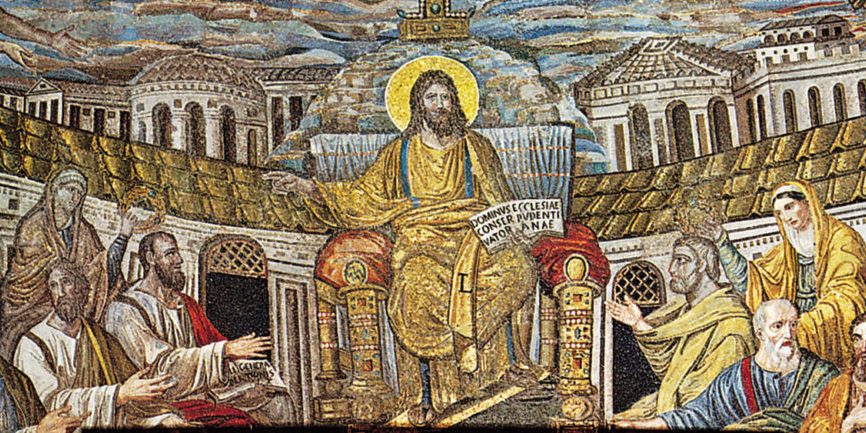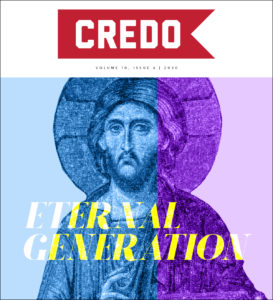
Begotten, Not Made
T he new issue of Credo Magazine focuses on the eternal generation of the Son. The following is an excerpt from one of the issue’s featured articles by Josh Malone. Malone is Associate Professor of Theological Studies at Palm Beach Atlantic University.
he new issue of Credo Magazine focuses on the eternal generation of the Son. The following is an excerpt from one of the issue’s featured articles by Josh Malone. Malone is Associate Professor of Theological Studies at Palm Beach Atlantic University.
In the fourth-century a famous debate was brewing, going back to at least Origen, and it came to a head with the Arian controversy. The dispute centered on specifying the origin of Jesus Christ in the eternal life of God. Was the Son made, even if his making was prior to and unlike the other creatures (as Arius taught), or was he eternally begotten (as bishop Alexander taught)? The pathway paved through this conflict has been called pro-Nicene, named from The Council of Nicaea (325). Nicaea formalized a pattern of biblical reasoning which authorized the doctrine of eternal generation as the orthodox way to speak of the Son’s perfect life.
The doctrine itself can be stated plainly: The Son is from the Father, and God has always been this way and did not become this way. We should take note that such a definition might threaten to elide the very divine ineffability it attempts to express. The patristic witness is replete with warnings here, so Gregory of Nazianzus, “The begetting of God must be honored by silence.”
Yet to draw back in this way is not to bring our theological reflection on God’s inner life to an end, rather it is to establish from the beginning spiritual disciplinary measures which guide how we are scripturally given to think and speak of the living God who dwells in unapproachable light (1 Tim. 6:16), comes as Light to enlighten (John 1:9), and of whom we thus confess that he is Light from Light. The doctrine of eternal generation therefore seeks, in faith and mystery, to confess that You, oh God, are “a fountain of life,” and that “in Your light we see light” (Ps 36:9).
How does eternal generation speak of this Light and Life? The doctrine’s dogmatic function in theology proper can be summarized under three themes: essential unity, personal distinction, and relational order (taxis).
Essential Unity
Eternal generation is attempting to follow the language of Scripture which affirms before the beginning the Word who is with God, as God (Jn 1:1), is none other than the only-begotten in the bosom of the Father (Jn 1:18). Share on X First, in what way does eternal generation speak of essential unity? Initially, it appears as though the confession of the Son as the only-begotten of the Father must strike against the doctrine of essential unity (divine simplicity). How can the one God be both Father and Son? The pro-Nicene answer can be seen by looking at the language of the two councils of Nicaea (325) and Constantinople (381). Both confess that the Son does not proceed from the Father as a creature from the Creator: he is begotten, not made.
The Son is not part of the created order; begetting is not the first act of creation. However, neither council attempts to fully explain what it means to be begotten, respecting the ineffability of this act. Rather, they assert there is a way to be “from” that is outside all beginnings (recalling Jn. 1:1). This generation is conceived as an act internal to God, such that the Father generates the Son of his substance, ek tas ousias tou Patros (325), and as such the Son is consubstantial, homoousion (325 and 381), with the Father.
Two things should be noted concerning this strange language. On the one hand, the homoousion is not employed to indicate some detachable metaphysic; the language offers no objective referent on its own, instead it functions as a conceptual summary of Scripture’s affirmation of the Son’s unity with the Father grounded in his ineffable generation.
On the other hand, this articulation of the Son’s generation is a denial that Begetter and Begotten are related as externally opposed realities. Instead, generation is the mode-of-sharing of the one undivided essence between Father and Son. As such, generation is conceived as a communication of the whole undivided essence, as Athanasius interprets with the language of “whole participation.” The Nicene Creed (381) adds the corresponding clause that the Son is, “begotten of the Father before all ages”, specifying the timeless and eternal nature of the Son’s generation. Dogmatically, begetting is a mode of divine unity, an affirmation of essential unity rather than a denial of it.
Personal Distinction
Second, in what way does eternal generation speak of personal distinction? To confess eternal generation is to deny that Jesus is Son of God by means of his miraculous virgin-birth, no less his baptism or resurrection – instead he is begotten of the Father before all ages. That this entails personal distinction seems rather straightforward, by analogy of creaturely generation, but confessing it is crucial for securing this reality as true in God (in se).
The doctrine of eternal generation is the pro-Nicene pathway by which this confession is conceptually articulated. It asserts that Father and Son are eternally related by origin alone, Begetter and Begotten, not by essential difference (since they share the same undivided essence). It affirms both their complete unity in all things pertaining to deity, and their personal distinction in all things pertaining to their uniqueness as Father and Son, that is, with respect to one another.
In this way, eternal generation is attempting to follow the language of Scripture which affirms before the beginning the Word who is with God, as God (Jn 1:1), is none other than the only-begotten in the bosom of the Father (Jn 1:18). Dogmatically, begetting is the ground of personal distinction, an affirmation of the eternal uniqueness of Father and Son without severance of the divine essence.
**Read the remainder of Josh Malone’s article in the latest issue of Credo Magazine.

